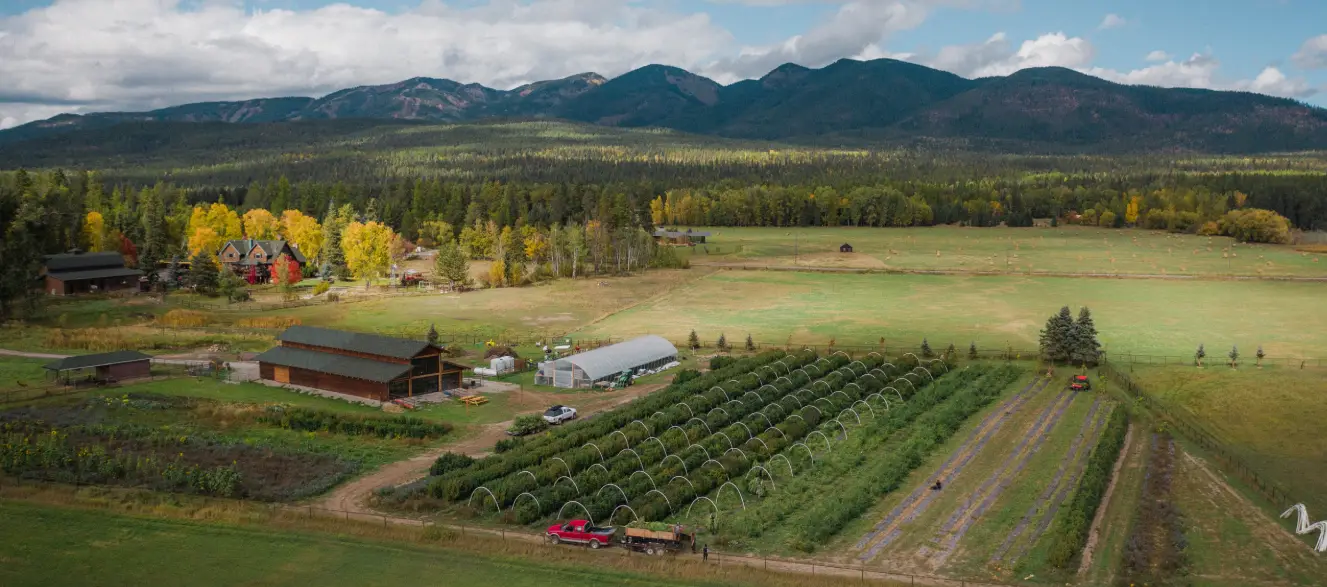December 2, 2024

Farmland is rapidly disappearing.
Montana alone is losing over 100,000 acres of valuable farmland each year to development. Flathead Valley is losing nearly 4,000 acres per year. Not only that, local food is losing to big agriculture. Only 3% of the food consumed by Montanans was actually grown or raised in Montana. This used to be ~70% in 1950 and has declined ever since. 🤯
So what’s going on here? What are the repercussions of both of these issues? And how do we fix them?
These are the exact questions we’ve been asking ourselves for the past two years as we’ve prepared to officially launch Save Farmland as a new 501(c)3 nonprofit here in Flathead Valley, Montana. And today’s that day.
You may have seen the “Save Farmland” logo around town, and thought to yourself — cool message, but what exactly is Save Farmland? What do they do? Is this even a legit organization?
All great questions! Here’s the 1-minute history…
Save Farmland started as a slogan on a mural, to raise awareness for the farm and ranch land that was quickly disappearing across Flathead Valley. The Haskill Creek owners (Scot, Carrie & Craig) decided to paint it on the side of their store and donate $1 of every order to the cause.
A year later, the Chisholms bought the 40 acres across from the store in Whitefish because it was set to be developed. Their plan was simple: protect this open space as farmland forever. But Save Farmland wasn’t a nonprofit yet. Outside of the 40-acre donation, it was just a mural on the side of a building.
Then Scot met Robin Kelson, the Executive Director of Abundant Montana. Robin introduced him to many incredible people that had been working on this issue from a variety of angles for many years. From Gretchen Boyer at Land to Hand, to Sophie Albert at North Valley Food Bank, to Todd & Rebecca at Two Bear Farm, to Sean and Brooke at Wicked Good Produce.
This kicked off a two year period of deep community engagement. Listening more than acting. Why? Because there was much to learn. We didn’t want to duplicate existing efforts. And we didn’t want to launch just “another nonprofit”.
So after countless conversations and working sessions, here’s what we heard back:
There isn’t a single organization whose sole purpose is to protect agricultural land, and then support the farming, ranching and local community with the very land it secures.
So, Save Farmland 2.0 was born…
Save Farmland’s mission is now clear: Protect the land that feeds us all. It started with the 40-acre parcel donated by the Chisholm’s, but we envision a future where Save Farmland has conserved thousands, if not millions, of acres someday.
However, we understand the need to crawl, walk, run as we build out a rock solid foundation for the organization. At its core, this means developing three major pillars over the next three years:
We are already planning our first major project on Voerman road in Whitefish, to include 10-15 micro-plots that can serve new farmers, existing farmers and local nonprofits. We plan to start prepping the land in 2025 and launch in 2027. As of the writing of this post, we have reserved some of this land for three food access nonprofit organizations — Land to Hand, North Valley Food Bank and FAST Blackfeet — who serve local schools and local families in Flathead and Glacier Counties, including the Blackfeet Nation in Browning, Montana.
To get program updates, you can join our distro here.
Since the Save Farmland mural went up in 2021, the organization was born from the community’s voice and vision. We want to express our deep gratitude to the individuals and organizations that have informed our approach so far:
Thank you for your support & partnership. We couldn’t be more excited to kick this journey off together!
With gratitude,
The Save Farmland team
—
To get updates join our distro here.
To follow us on Instagram click here.
To make a recurring donation and join The Keep, click here.